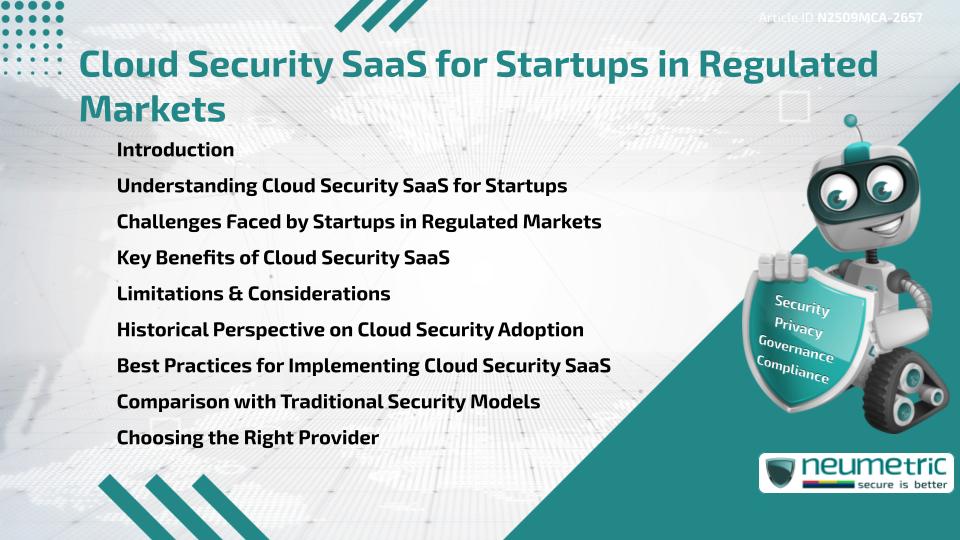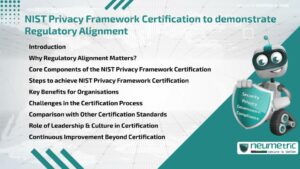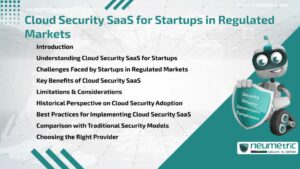Table of Contents
ToggleIntroduction
Cloud Security SaaS for startups is a critical enabler for young businesses that operate in highly regulated industries such as Healthcare, banking & legal services. These startups face unique challenges in balancing growth with compliance, Data Privacy & security obligations. By leveraging cloud-based security solutions, they gain scalable protection, cost efficiency & easier alignment with regulatory frameworks. This article explores the advantages, challenges, history & Best Practices of adopting Cloud Security SaaS for startups, while offering practical comparisons with traditional approaches.
Understanding Cloud Security SaaS for Startups
Software-as-a-Service [SaaS] delivers security tools over the cloud, eliminating the need for heavy in-house infrastructure. For startups, this means access to advanced technologies such as encryption, identity management & Continuous Monitoring without large upfront investments. In regulated markets, where fines & reputational damage can be severe, Cloud Security saas for startups provides a way to meet obligations quickly & efficiently.
Challenges Faced by Startups in Regulated Markets
Startups in regulated sectors often encounter three major obstacles:
- Compliance complexity: Frameworks like HIPAA, PCI DSS & GDPR demand strict controls.
- Resource limitations: Unlike large corporations, startups cannot maintain full security teams.
- Rapid growth Risks: As startups scale, Security Gaps can widen, leaving them vulnerable.
These hurdles make outsourcing security functions to a reliable SaaS provider an attractive option.
Key Benefits of Cloud Security SaaS
The benefits of adopting Cloud Security SaaS for startups include:
- Scalability: Easily adjust protections as the business grows.
- Cost-effectiveness: Pay-as-you-go models reduce capital expenditure.
- Compliance support: Built-in frameworks simplify audits & reporting.
- Faster deployment: Quick setup allows startups to focus on innovation.
This model empowers startups to compete confidently while staying within regulatory limits.
Limitations & Considerations
Despite its appeal, Cloud Security SaaS for startups has limitations. Dependence on a Third Party provider can raise concerns about vendor reliability, data residency & service outages. Additionally, shared responsibility models mean startups must still maintain internal Policies, training & oversight. Blind trust in SaaS without internal checks could lead to compliance gaps.
Historical Perspective on Cloud Security Adoption
In the early days of cloud adoption, many regulated businesses resisted due to fears of losing control over Sensitive Data. Over time, as providers matured, they invested in Certifications & global compliance standards, easing those concerns. Today, Cloud Security saas for startups is widely accepted, with providers offering compliance-ready services that would have been unimaginable a decade ago.
Best Practices for Implementing Cloud Security SaaS
To maximize value, startups should:
- Select providers with relevant industry Certifications.
- Train staff to avoid phishing & insider Risks.
- Regularly Audit & test controls.
- Ensure strong service-level agreements [SLAs] are in place.
These practices align technology with people & processes, strengthening overall security posture.
Comparison with Traditional Security Models
Traditional security requires heavy infrastructure investments & on-site management, which is impractical for startups. In contrast, Cloud Security saas for startups offers flexibility & reduced overhead. However, startups operating in highly sensitive industries may still choose a hybrid model, keeping Critical Assets on-premise while outsourcing routine protections.
Choosing the Right Provider
The right SaaS partner makes the difference. Startups should evaluate vendors on:
- Compliance readiness
- Reputation & track record
- Transparency in incident reporting
- Integration capabilities with existing tools
By carefully vetting providers, startups can avoid pitfalls & build resilience against Cyber Threats.
Conclusion
Cloud Security SaaS for startups has emerged as a vital tool for navigating the demanding landscape of regulated markets. It enables businesses to innovate quickly without compromising compliance or security. While not without its challenges, this model has proven its value as a scalable & efficient solution.
Takeaways
- Cloud Security SaaS for startups simplifies compliance & security.
- It balances growth with regulatory requirements.
- Startups must still manage internal Policies & oversight.
- Choosing the right provider is critical for long-term success.
FAQ
What is Cloud Security SaaS for startups?
It is a cloud-based solution offering startups security tools such as monitoring, encryption & compliance frameworks without needing on-premise infrastructure.
Why is it important in regulated markets?
It helps startups meet strict legal & compliance obligations while focusing resources on innovation & growth.
How does it differ from traditional security models?
Traditional models require heavy infrastructure investments, while SaaS provides flexible, pay-as-you-go options with faster deployment.
What Risks should startups consider?
Startups must consider vendor reliability, data residency issues & the need for internal Policies despite outsourcing.
Can Cloud Security SaaS guarantee compliance?
No, it supports compliance but startups remain responsible for certain internal practices such as training & Access Control.
What are examples of regulated markets?
Healthcare, Finance & legal services are common examples where Compliance Requirements are strict.
How can startups choose the right provider?
By checking Certifications, track record, transparency & integration capabilities to ensure long-term trust & support.
Need help for Security, Privacy, Governance & VAPT?
Neumetric provides organisations the necessary help to achieve their Cybersecurity, Compliance, Governance, Privacy, Certifications & Pentesting needs.
Organisations & Businesses, specifically those which provide SaaS & AI Solutions in the Fintech, BFSI & other regulated sectors, usually need a Cybersecurity Partner for meeting & maintaining the ongoing Security & Privacy needs & requirements of their Enterprise Clients & Privacy conscious Customers.
SOC 2, ISO 27001, ISO 42001, NIST, HIPAA, HECVAT, EU GDPR are some of the Frameworks that are served by Fusion – a SaaS, multimodular, multitenant, centralised, automated, Cybersecurity & Compliance Management system.
Neumetric also provides Expert Services for technical security which covers VAPT for Web Applications, APIs, iOS & Android Mobile Apps, Security Testing for AWS & other Cloud Environments & Cloud Infrastructure & other similar scopes.
Reach out to us by Email or filling out the Contact Form…





